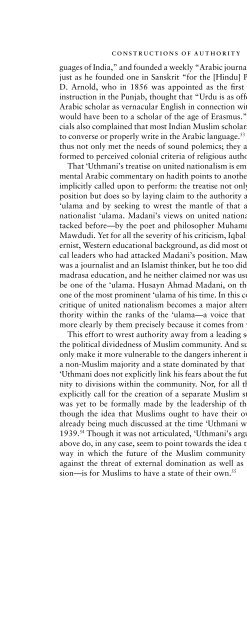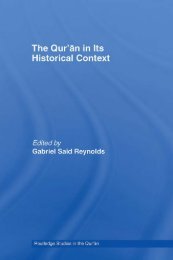Download (1 MB) - Islam and Christian-Muslim Relations: Articles ...
Download (1 MB) - Islam and Christian-Muslim Relations: Articles ...
Download (1 MB) - Islam and Christian-Muslim Relations: Articles ...
You also want an ePaper? Increase the reach of your titles
YUMPU automatically turns print PDFs into web optimized ePapers that Google loves.
CONSTRUCTIONS OF AUTHORITY 47guages of India,” <strong>and</strong> founded a weekly“Arabic journal for the maulavis”just as he founded one in Sanskrit “for the [Hindu] P<strong>and</strong>its.” 51 And W.D. Arnold, who in 1856 was appointed as the first director of publicinstruction in the Punjab, thought that “Urdu is as offensive to a learnedArabic scholar as vernacular English in connection with English subjectswould have been to a scholar of the age of Erasmus.” 52 Yet English officialsalso complained that most Indian <strong>Muslim</strong> scholars lacked the abilityto converse or properlywrite in the Arabic language. 53 Writings in Arabicthus not onlymet the needs of sound polemics; theyalso mayhave conformedto perceived colonial criteria of religious authority.That ‘Uthmani’s treatise on united nationalism is embedded in a monumentalArabic commentaryon hadith points to another function it seemsimplicitlycalled upon to perform: the treatise not onlyrefutes Madani’sposition but does so bylaying claim to the authority<strong>and</strong> learning of the‘ulama <strong>and</strong> byseeking to wrest the mantle of that authorityfrom thenationalist ‘ulama. Madani’s views on united nationalism had been attackedbefore—bythe poet <strong>and</strong> philosopher Muhammad Iqbal, <strong>and</strong> byMawdudi. Yet for all the severityof his criticism, Iqbal came from a modernist,Western educational background, as did most other <strong>Muslim</strong> politicalleaders who had attacked Madani’s position. Mawdudi, for his part,was a journalist <strong>and</strong> an <strong>Islam</strong>ist thinker, but he too did not have a formalmadrasa education, <strong>and</strong> he neither claimed nor was usuallyrecognized tobe one of the ‘ulama. Husayn Ahmad Madani, on the other h<strong>and</strong>, wasone of the most prominent ‘ulama of his time. In this context, ‘Uthmani’scritique of united nationalism becomes a major alternative voice of authoritywithinthe ranks of the ‘ulama—a voice that seeks to be heardmore clearlybythem preciselybecause it comes from within.This effort to wrest authorityawayfrom a leading scholar also revealsthe political dividedness of <strong>Muslim</strong> community. And such divisions couldonlymake it more vulnerable to the dangers inherent in being exposed toa non-<strong>Muslim</strong> majority<strong>and</strong> a state dominated bythat majority. Notably,‘Uthmani does not explicitlylink his fears about the future of the communitytodivisions within the community. Nor, for all these fears, does heexplicitlycall for the creation of a separate <strong>Muslim</strong> state. That dem<strong>and</strong>was yet to be formallymade bythe leadership of the <strong>Muslim</strong> League,though the idea that <strong>Muslim</strong>s ought to have their own homel<strong>and</strong> wasalreadybeing much discussed at the time ‘Uthmani wrote his treatise in1939. 54 Though it was not articulated, ‘Uthmani’s arguments as outlinedabove do, in anycase, seem to point towards the idea that the onlyviablewayin which the future of the <strong>Muslim</strong> communitycan be secured—against the threat of external domination as well as of internal dissension—isfor <strong>Muslim</strong>s to have a state of their own. 55



